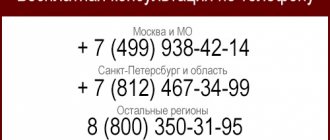The nuances of installment payments for utility bills in 2019
Recently, many Russians have been experiencing various problems with paying for utilities, as their costs regularly rise.
Dear readers! The article talks about typical ways to resolve legal issues, but each case is individual. If you want to find out how to solve your particular problem, contact a consultant:
+7 (St. Petersburg)
APPLICATIONS AND CALLS ARE ACCEPTED 24/7 and 7 days a week.
It's fast and FREE!
At the same time, many citizens do not know how payment in installments for utility bills is carried out and how this issue is regulated by law.
Reasons for refusal
A request for debt restructuring for utility bills may not always be satisfied. Sometimes management companies refuse payers.
The refusal may be due to the absence of statutory obligations of the management company to carry out restructuring. Therefore, the decision can be made on a voluntary basis.
If the management company agrees to the payer’s proposal, the result may be positive. In this case, the likelihood of a pre-trial settlement of the conflict increases, since the debtor undertakes to pay off the debt through a peaceful resolution.
Payers cannot require the service provider to enter into a debt restructuring agreement. This is a right of the Criminal Code, not an obligation
. Moreover, the refusal is not always motivated by the supplier’s lack of desire to make concessions.
The conclusion of an agreement is possible until the case is heard in court. In this case, the user can apply for a deferred payment or installment payment of the debt.
To avoid conflict situations, utility payments must be made no later than the 10th of each month. Otherwise, a penalty will be charged for non-payment, and the debt will grow.
A certificate of loan debt is required in certain situations for filing financial statements of an enterprise.
Find out how to properly write off accounts payable from this article.
Read more about the concept of accounts receivable and the reasons for its occurrence here.
Often, due to the fault of residents, debts arise to utility services to pay payments for heat, water, and electricity. This problem is quite painful for many, since the systematic increase in tariffs for many families results in an increase in debt
. However, refusing to pay at all is a bad option that will lead to the most unpleasant consequences.
In law
collect a debt
management companies can, using a variety of methods. Residents may have their services limited or terminated until repayment
debt
.
If the matter comes to trial, then collection will be carried out forcibly, and the property may be seized with its subsequent sale through the auction procedure. It may even lead to eviction from the apartment.
To prevent this, you should try to solve the problem peacefully. Many service representatives are ready to compromise and negotiate with the debtor on payment of the debt in installments
. For this purpose, an agreement is signed to repay debts on utility bills.
Laws governing these relationships
An extremely detailed structure of payment for utility services is prescribed in the Housing Code, and in particular, it contains information about where and within what time frame the payment should be transferred, as well as the procedure and rules for providing subsidies or reimbursement of expenses.
All information about the deadlines for transferring transactions for consumed utilities is stated in Article 155 of this code, while Article 154 provides general information about how the cost of utility payments is calculated.
In addition, a specialized Law was issued that unites all laws, according to which, throughout 2020, various changes were made to the Housing Code, affecting the procedure for paying for utility services. The rules by which payments are calculated, as well as their further recalculation, are prescribed in Government Resolution No. 354.
Is a loan possible?
Starting in 2012, new rules governing the provision of utility services came into force. Based on these rules, all willful defaulters will ultimately face fairly severe penalties, while conscientious payers, on the contrary, may be provided with all sorts of relaxations.
One of the key innovations is that, if necessary, citizens can order an installment plan for utility debt. The provision of this service is provided only for those persons who this year pay utility bills at a rate that exceeds by more than 25% the cost of the same resource in the previous year.
The provision of installment plans is carried out on standard conditions: a person pays in equal parts his accumulated debt for utilities throughout the month, including the month from which the initial payment was provided.
Read in this publication how to divide utility bills.
Installment payment for utility bills
In accordance with paragraphs 72-77 of Government Decree No. 354, issued on May 6, 2011, installment plans are provided to citizens on conditions under which they must pay the accumulated amount of debt in equal installments over 12 months, with the first payment being made already in the month from which she starts to act.
Although interest for the use of this service is initially provided for in the current legislation, it will not be accrued or will ultimately be reduced if the contractor receives appropriate compensation from the regional budget.
In addition, as mentioned above, the service itself can only be provided if tariffs have increased by at least 25% compared to those in effect during the same period last year.
Sample application for installment plan for utility bills
Who and how can apply
In addition to the situation where over the last year there has been a significant increase in utility tariffs, there is another option in which a citizen has the right to use the debt payment service in installments. In particular, we are talking about any unforeseen situations due to which a person lost the opportunity to fully pay for utility services, as a result of which the specified debt arose.
In this case, an agreement with the debtor can only be drawn up by the management company that provides the relevant services to the debtor. She will need to indicate in the agreement the possibility of paying the accumulated debt in installments, and this type of installment plan is optional, and if authorized employees refuse to provide such a service, it will be possible to obtain it only in court.
The agreement must initially include all the conditions under which the deferment and subsequent payment of the debt will be carried out. In addition, the relevant rules must be specified in the receipt on the basis of which payment is made.
Statement and Agreement
If the reason for non-payment of utilities is an increase in utility tariffs, then in this case you will first need to apply for a corresponding extract from the EIRC. If necessary, this operation can be carried out remotely by completing the necessary steps on the official website of this body.
After this, an agreement is drawn up between the management company and the debtor, which must contain the following information:
- information about each party;
- agreement number;
- the amount of debt that the debtor will ultimately have to repay;
- the amount of payment that will be made by the obligated person monthly;
- interest that is applied to the total amount of debt;
- signatures of each party.
Interest payment
In accordance with paragraph 72 of the established rules, installment plans are provided on the basis of monthly transfer of a certain amount of payments for one year. At the same time, for the provision of this service a certain percentage must be charged, the amount of which cannot exceed 3% of the refinancing rate adopted by the Central Bank, valid at the time of provision of the installment plan.
Interest for installment plans will not be accrued in principle, or their amount can be significantly reduced if the contractor can receive, from budgetary funds, appropriate compensation for the money that he does not receive in the form of interest for providing the consumer with this service.
The execution of an agreement on the provision of installment plans cannot be considered as an obstacle to a citizen paying the balance of the required amount ahead of schedule, fully repaying the debt that has arisen.
Can they refuse?
If there are compelling reasons for providing an installment plan specified in paragraph 72 of the established rules, then in this case the authorized employees of the management company do not have the right to refuse to provide an installment plan to the payer. If a refusal is received, it can be challenged in court, and in addition, if desired, the interested person can file a corresponding complaint with the prosecutor's office. In other cases, the need to provide installment plans remains with the contractor.
From January 1, 2020, the procedure according to which fees should be calculated for non-payment of utilities has undergone certain changes.
In accordance with the rules prescribed in the updated version of Article 155 of the Housing Code, the penalty provided for non-payment of utilities should not be accrued from the day following the day of the required payment period, as was previously provided, but only after the debt persists for one month.
What determines the size of utility bills - read on.
We will also tell you how you can write off utility debts.
- Due to frequent changes in legislation, information sometimes becomes outdated faster than we can update it on the website.
- All cases are very individual and depend on many factors. Basic information does not guarantee a solution to your specific problems.
That's why FREE expert consultants work for you around the clock!
- via the form (below), or via online chat
- Call the hotline:
- Moscow and the Region
- St. Petersburg and region
- Regions
APPLICATIONS AND CALLS ARE ACCEPTED 24/7 and 7 days a week.
Agreement for the provision of public services to the population
4.4. If the Customer systematically refuses to pay for services, the Contractor has the right to stop providing services by notifying the Customer 5 days in advance. The provision of services is resumed after repayment of the debt with reimbursement to the Contractor of expenses incurred in connection with this.
User of non-residential premises (s, buildings): ____________________ (user name) represented by _____________________________________ position, surname, first name, patronymic acting on the basis of ________________________________, on the other hand, have concluded this Agreement as follows:
12 Sep 2020 yslygiur 3189
Share this post
- Related Posts
- Who Takes Advantage of Land Rental Benefits in a Garage Cooperative
- How to write a complaint to the military prosecutor's office examples
- Are military pensioners entitled to disabled people of group 3?
- Grounds for invalidating a transaction
Urgent issue (court for housing and communal services debts)
if you pay, you can present evidence of payment of part of the debt directly at the court hearing
to pay now or not depends on whether there are any fines and penalties or not. Before the trial, the Criminal Code will automatically count your payment first to pay off these fines. if there is only pure debt in the calculation, you can pay
by installments, the court will make a decision in principle based on the fact of your debt. Then the creditor will receive a writ of execution and contact the bailiff service, and here you will need to submit to the same court an application for installment payment of the debt; this application will suspend the execution of the decision, and there you will also tell about poverty, present a schedule and thousands and thousands.
Installment agreement for utility bills
One of the ways to obtain an installment plan is to enter into an installment agreement with the utility company for the debt on utility bills.
Dear readers! The article talks about typical ways to resolve legal issues, but each case is individual. If you want to find out how to solve your particular problem, contact a consultant:
+7 (St. Petersburg)
APPLICATIONS AND CALLS ARE ACCEPTED 24/7 and 7 days a week.
It's fast and FREE!
This agreement can be concluded if the debtor wants to pay part of the debt monthly and does not want to take the matter to court.
Court
The law does not stipulate the need to conclude an agreement on the restructuring of utility bills between the debtor and the management company. Therefore, if there is no obligation, then the organization has the right to refuse the client this procedure.
If the payer has grounds for restructuring, he can file a lawsuit. The authority is selected depending on the size of the debt. Cases are heard in a district or magistrate court
. The payer may request payment in installments.
It is necessary to supplement the statement of claim with a complete package of documents. The list is similar to the one submitted to the management company.
Payment for housing and communal services
The main responsibility of the consumer is to pay for the use of utilities by the 10th day of the month following the previous month (Article 153 of the RF LC, Article 155 of the RF LC).
Today there are enough ways in which you can pay for utilities:
Failure to pay on time may result in negative consequences for the consumer.
As lawyers advise, to prevent them from occurring, you must pay at least part of the monthly payment amount every month.
Incurrence of debt
Rent debt can accumulate if a citizen stops paying utility bills, even partially.
The formation of debt is not possible for all payments, but only for certain utilities, that is, the consumer pays only, for example, for heating and maintenance of the local area.
In this case, as a rule, the debtor, after receiving notice of the debt, tries to pay off the debt.
Often, a debt arises due to the fault of a utility company, when payments are incorrectly calculated or calculations are incorrect, for which citizens receive receipts with an inflated amount.
As statistics show:
- about a third of the population does not pay their debts;
- half of the population pays debts only after receiving installments;
- the remainder are conscientious consumers who pay the debt upon receipt of notification from utility services.
If the owner does not pay utility bills, what will happen to him? See here.
Consequences
If payment is not made on time, a penalty will be charged for each day of delay on the payment amount. The amount of the penalty is calculated based on the refinancing rate of the Central Bank of the Russian Federation.
When calculating penalties, only 1/300 of the rate that existed for the period of the debt is taken.
The first thing the utility company does is send debtors a notice of debt, which provides information:
- about the timing of its repayment;
- amount of debt.
This document confirms the fact that utility companies work with consumers, who thus resolve disputes in a pre-trial manner.
According to the Decree of the Government of the Russian Federation of May 6, 2011 No. 354, a utility company, upon prior notice, can disconnect a consumer from receiving utility services if the person has not repaid the debt within 30 days and paid for the service in part.
In addition, when living in a municipal apartment, tenants can be evicted from the apartment if they have not paid utility bills for 6 months.
Agreement on the procedure and amount of participation in the costs of paying for residential premises
8. In the event of early termination of this Agreement on the grounds provided for in paragraph 4 of this Agreement, the Parties request the Main Information System of the ______________ district, starting from the first day of the month following the month in which the debt was incurred, to generate a single payment document to pay for all housing and communal services in the residential premises.
Interesting: Kvr u kosgu 226
1. The parties agreed that the accrued payment for residential premises, utilities and other services (hereinafter referred to as housing and communal services) in a residential premises located at the address: ______________________________________________________________ ________________________________________________________________________, (index, city, street, house, building, building, apartment) is paid by them to in the following shares: 1.1. Side 1 – ___% (________ percent) of the accrued payment for housing and communal services; 1.2. Side 2 – ___% (________ percent) of the accrued payment for housing and communal services.
Installment payment for utility bills
In accordance with paragraphs 72-77 of the Decree of the Government of the Russian Federation dated May 6, 2011 No. 354, installment payment for utility bills can be provided to a citizen, subject to payments being made in equal installments within 12 months, including the month from which the installment plan was provided.
It is worth noting that interest will also be charged, which may be 3% more than the refinancing rate of the Central Bank of the Russian Federation in effect at the time the installment plan is granted.
However, the percentage will not be accrued, or will be less, if the contractor was provided with compensation from the local or regional budget.
Installment plans are provided to citizens whose payment amount for the billing period has increased by 25% of the same period for the previous year.
To receive an installment plan to repay a debt, a person must be a bona fide payer.
This debt repayment opportunity is available only to those who:
- did not abuse this right;
- I used to pay utility bills on time.
You can refuse to further pay the debt in installments if the debtor has previously paid the remaining amount of the debt in full.
If the consumer has the right to certain benefits for paying for utilities, then when installments are provided, the amount of debt will be reduced by the amount of such benefit.
How to apply?
The contractor informs the consumer about the receipt of the installment plan in the payment document, which provides information about the payment on installment terms.
Upon receipt of such a receipt, the consumer has the right to pay the debt in the following ways:
- pay for the service on terms of installment payments;
- pay the entire amount of the debt at once;
- use the opportunity provided, and then pay the remaining amount of the debt ahead of schedule, if this does not require the consent of the executor.
If you choose to pay your debt in installments, you will need to pay the debt amount throughout the year in equal parts, taking into account the month from which the opportunity to pay the debt in this way was provided.
It is worth remembering that in this case the debtor will be charged additional interest for the installment plan.
The document states:
- creditor and debtor data;
- amount of debt;
- contract number;
- debt payment deadline;
- the amount of monthly payments;
- signatures of the parties.
Interested in calculating utility bills in 2020? Read here.
Don’t know where to look at the list of utility debtors? Useful information in this article.
Conclusion of an agreement
To pay off the debt, the utility company may enter into a debt payment agreement with the consumer.
By concluding this agreement, the debtor undertakes to repay the debt by:
- payment of the debt in a single payment (the amount must be paid within a month from the date of conclusion of the contract);
- payment of the debt in installments over 6 months, the first part of the amount must be paid within a month from the date of conclusion of the agreement);
- payment of the debt for 6 months, the first payment amount must be paid within two months from the date of signing the agreement).
An agreement to pay in installments for utility bills must include the following information:
- date and place of conclusion of the contract;
- information about the debtor (consumer) and creditor (utility company);
- basis for concluding the agreement (Charter of the enterprise);
- the amount of debt, and for which utilities the specific amount of debt and penalties is indicated;
- debt repayment schedule and specific date for monthly payments;
- the debtor's obligations to pay the debt according to the established schedule;
- the obligation of the creditor to suspend the accrual of penalties from the moment the installment plan is granted until the debt is fully repaid;
- signatures of the parties.
Disadvantages of such payment
The problem with providing consumers with installment plans is the need to hire additional staff of accountants whose responsibilities will include working with such payments.
When repaying a debt, the consumer must pay interest.
This does not really suit citizens, because no one will want to overpay anyway, even if minimum interest rates are established.
Consequences of debt
If the next utility payment is not made on time, the debt grows exponentially. This growth is due to penalties, which are accrued every day.
. Once the debt reaches a large size, it becomes almost impossible for the payer to repay the debt.
If payments are not made, other measures may be taken. The company that provides the services may limit them for a certain time. Restrictions may be associated with a reduction in the volume of the service, as well as permission to use it at a certain time.
If in the future the user does not pay for receiving services, their supply may be completely stopped. The procedure for notifying the debtor about this measure is established by law.
Rules for the provision of public services to the population
After the payer receives a notice about the imminent termination of the supply of water, gas or electricity, the payment must be made in full. If this does not happen, then the company turns off utilities for the client.








